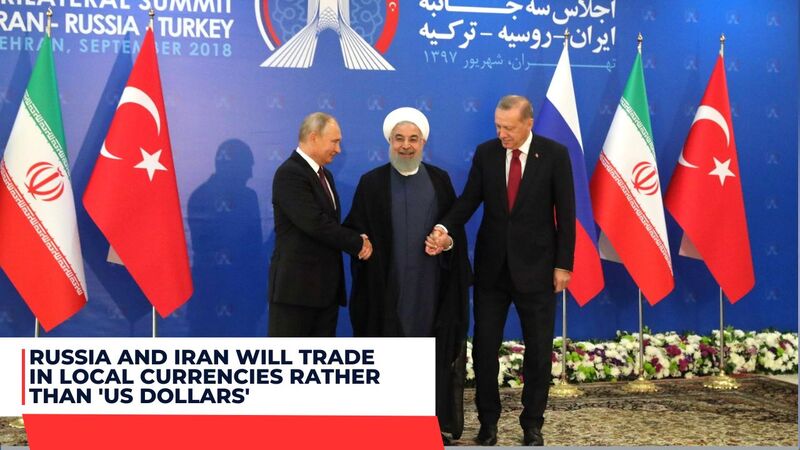Iran and Russia, two BRICS member nations, recently came to an agreement to abandon the US Dollar in their bilateral trade relations, in line with wider BRICS de-dollarization efforts.
Russia and Iran both face international sanctions from the West that limit economic activities in both countries. This partnership demonstrates their mutual desire to overcome those restrictions.
Iran Russia to Trade in Local Currencies Instead of US Dollar
Iran and Russia have reached an agreement to trade exclusively in their local currencies instead of US Dollars, according to state media. This move marks a notable development, avoiding traditional uses of US dollars for bilateral trade settlements as well as contributing to de-dollarization efforts among BRICS nations.
Following a meeting between the governors of both countries’ central banks in Russia, this move allows Iranian and Russian banks and economic actors to utilize non-SWIFT interbank systems when conducting local currency transactions.
This move symbolizes their growing ties, particularly amid economic difficulties and sanctions. Additionally, this development advances BRICS’ goal of de-dollarizing global trade while potentially altering international relationships and the balance of power. Furthermore, Russia signed deals earlier this year with Iran for purchasing Su-35 fighter jets, Mi-28 attack helicopters, and Yak-130 pilot training aircraft – furthering these links between their nations.
BRICS De-Dollarization
As global economic dynamics change, countries and groups of countries possess the power to shift paradigms. One notable group that has garnered much attention is BRICS (Brazil, Russia, India, China and South Africa), who are taking steps to de-dollarize their international financial architecture – this means decreasing use of dollar-denominated currencies in bilateral trade and investment deals; ultimately their goal is not replacing US Dollar hegemony but instead creating alternatives in its place for future use.
Though there has been much scholarship on currency power and economic statecraft, few studies have examined BRICS as an alliance that seeks to change the current global financial system from within. This article seeks to fill this void by proposing the BRICS De-Dollarization Initiatives Framework as well as discussing their role as a coalition within global political economy.

Iran Russia Military Cooperation
Russia-Iran military cooperation presents increased risk to Western interests. It is driven by domestic political trends in both countries away from normalisation with the West; Russia wishes to deepen defense ties with Iran but remains concerned that Tehran might act as a balance against it regionally.
Russia’s desire to resume arms sales to Iran indicates a shift in priorities following Western sanctions, according to one economic expert. He saw Iran’s trade flows as providing the ideal partner for rebalancing Russia’s post-2010 sanctions needs.
Russia and Iran have joined forces to sidestep U.S. and EU sanctions by using local currencies instead of dollars for transactions between each other. Both nations have entered a free-trade agreement under the Eurasian Economic Union which allows for trade between non-SWIFT interbank systems; Iran hopes to acquire billions worth of Russian weapons such as Su-35 fighter jets, Mil Mi-28 attack helicopters and Yak-130 combat trainer aircraft from Russia.
Iran Russia Economic Cooperation
Iran and Russia’s decision to abandon the US greenback for their bilateral trade agreements represents a devastating blow to its dominance of global transactions, as both nations bypass Western sanctions that have limited their access to global financial and banking platforms.
This initiative will enable both nations to expand economic ties, change global trade dynamics and form an alternative world order which diffuses power away from Western institutions.
Moscow and Tehran have jointly adopted an action plan for strengthening alternative financing platforms, de-dollarisation efforts and regional transport infrastructure development. Both countries also work to tighten military cooperation; the conflict in Ukraine has made them dependent on each other to fight off Western pressures and sanctions. Iran recently announced that arrangements had been finalized with Russia for Su-35 fighter jets, Mi-28 attack helicopters and Yak-130 pilot training aircraft to be supplied from Moscow.






